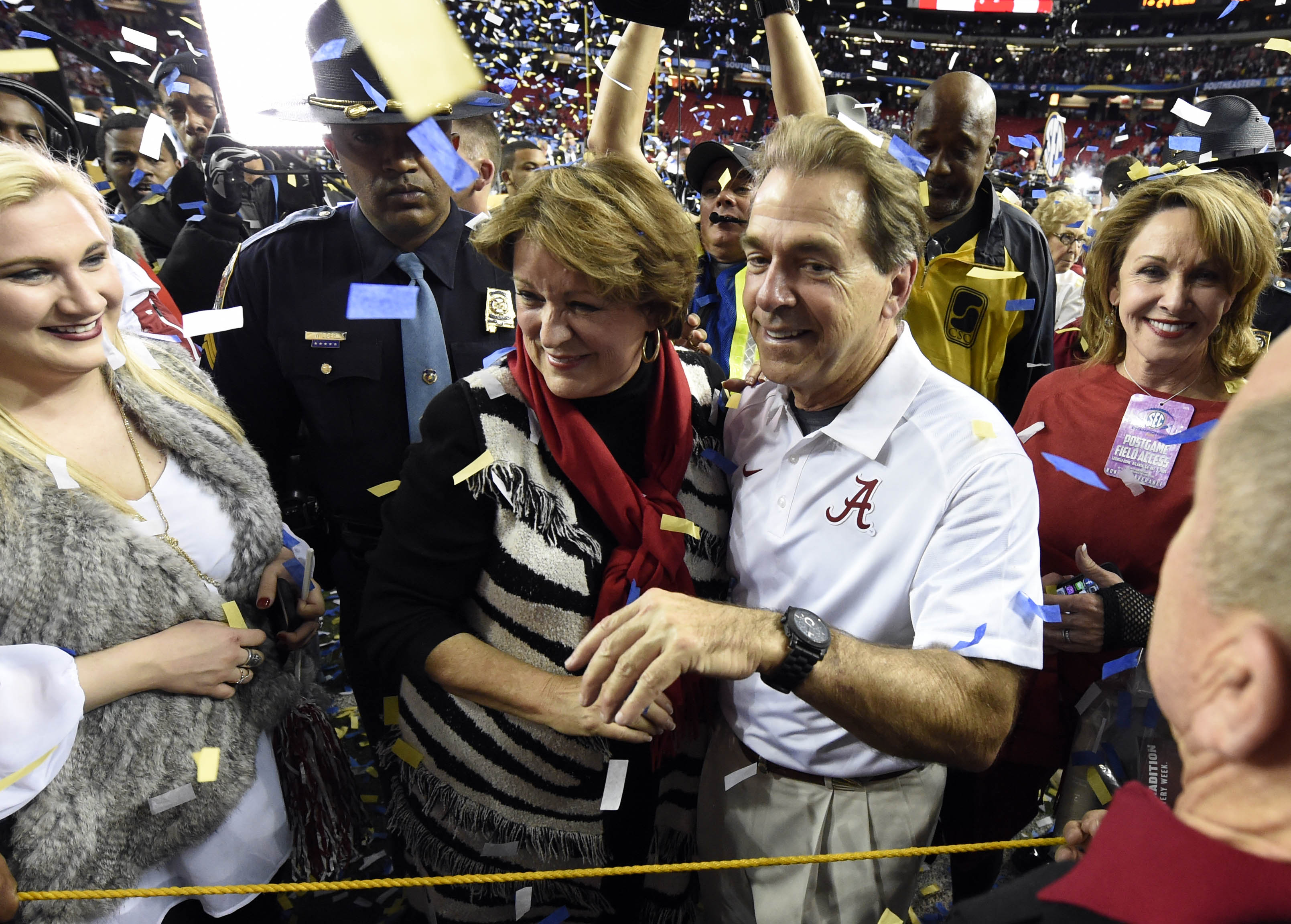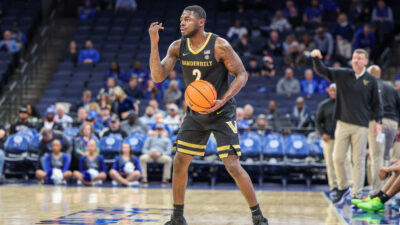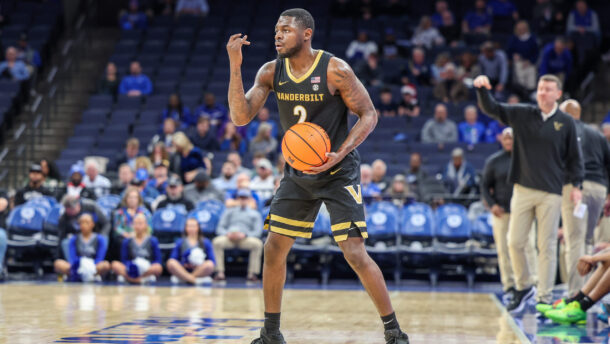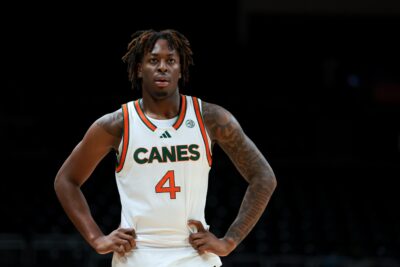
SEC coaching changes: History shows next guy not always right guy
By Chris Wright
Published:
Everybody’s chasing Alabama. Everybody’s chasing championships. Division titles. Conference titles. The ultimate title.
In the SEC, when coaches fall short — far enough, often enough — they don’t stay SEC coaches for long.
The new guy, of course, isn’t always the right guy. In fact, he rarely is.
Even Alabama went through three coaches in 10 seasons before Nick Saban.
Changing coaches is the norm in the SEC, where the carousel carved up three more names in 2015.
If you’re looking for stability, look elsewhere: 18 of the previous 37 hires didn’t make it to a fifth season, not including active coaches approaching the relatively modest milestone.
Think about that: Almost half of those head coaches were gone before their first recruiting class graduated.
The result is just three head coaches have led their program longer than five seasons.
Counting new hires over the past 20 seasons, here’s a look at how the next 5 years have gone with each new coach.
Alabama (4 coaches)
Mike DuBose (1997-2000): Fired/resigned after going 24-23 in four rocky seasons marked by a scandal and SEC title.
Dennis Franchione (2001-02): Surprisingly left for Texas A&M after 17-8 in two seasons.
Mike Shula (2003-2006): Right last name, but there was nothing perfect about his tenure. Shula 26-23 in four years. The third consecutive Alabama coach to last fewer than five seasons.
Nick Saban (2007-present): The home run hire who is going for his fourth national championship with the Tide.
Arkansas (4 coaches)
Houston Nutt (1998-2007): Only Frank Boyles won more games as a Razorbacks coach, but the final years were turbulent and led to his decision to resign.
Bobby Petrino (2008-11): He left a note with his Atlanta Falcons players saying he was leaving. Somehow that wasn’t even his worst finishing act. Not even winning — just third Arkansas coach to post consecutive 10-win seasons — was enough to save him from himself.
John Smith (2012): Hired an interim basis after Petrino wrecked his and Arkansas’ reputation, went 4-8 in only season.
Bret Bielema (2013-present): Has chance to lead Arkansas to bowl wins in consecutive seasons for first time in program history.
Auburn (3 coaches)
Tommy Tuberville (1999-2008): Restored stability after Auburn fired Terry Bowden midway through the 1998 season. Highlight was the undefeated 2004 split championship season. Went 85-40 in 10 seasons, but Saban’s arrival changed the dynamic in Alabama, leading to Tuberville’s resignation.
Gene Chizik (2009-2012): Chizik, with Cam Newton’s help, led the Tigers to the 2011 BCS championship but still couldn’t last five seasons after Auburn fell to 3-9 the following season.
Gus Malzahn (2013-present): He’s 26-13 after three seasons, but Auburn fell well short of lofty preseason expectations. He and LSU’s Les Miles have the hottest seats in the SEC.
Florida (4 coaches)
Ron Zook (2002-04): Zook had the unenviable task of replacing the Head Ball Coach, who won a program-record 122 games and Florida’s first national championship during his 12-year stint at his alma mater. This was Zook’s first head coaching job, and it lasted just three seasons. He was fired after going 23-14.
Urban Meyer (2005-10): Has any successful coach been more despised? Meyer, with help from Tim Tebow, won two BCS championships. Gators fans could ignore the string of arrests on his watch, but turned on him once he resigned for family issues, then quickly accepted the head coaching job at Ohio State.
Will Muschamp (2011-14): Florida again hired a first-time head coach, and like Zook, it was rocky. Muschamp, like many on this list, didn’t make it to a fifth season. He was fired after going 28-21 in four seasons.
Jim McElwain (2015-present): The personable McElwain won SEC Coach of the Year in his Gators debut, doing so largely without a quarterback.
Georgia (2 coaches)
Jim Donnan (1996-2000): Donnan went 40-19 and 4-0 in bowl games. Good. Not good enough. He was fired after his fifth season, when the Bulldogs slumped to 7-4.
Mark Richt (2001-15): Richt was a first-time head coach who won more games than any Bulldogs coach not named Vince Dooley. But he didn’t win an SEC Championship after 2005. Ultimately, that led to his departure and the hiring of first-year head coach Kirby Smart.
Kentucky (5 coaches)
Hal Mumme (1997-2000): He inherited a program that went 26-52 the previous seven seasons. By those standards, he succeeded — going 20-26 in four seasons. He was accused of taking shortcuts, however, and resigned after Kentucky started an internal investigation into his recruiting tactics.
Guy Morriss (2001-02): Hired to fix the Mumme mess, Morriss went 9-14 before resigning to take the Baylor head coaching job.
Rich Brooks (2003-09): Brooks went 39-47 and guided the Wildcats to four bowl games, winning three. Only one other Kentucky coach went to to four bowl games and won three: Bear Bryant. Brooks retired at the age of 68.
Joker Phillips (2010-12): Another first-time head coach who didn’t come close to meeting expectations, even Kentucky’s, where the bar is lower. Phillips’ 13-24 stint ended with an embarassing 40-0 home loss to Vanderbilt.
Mark Stoops (2013-present): Stoops has won one fewer game than Phillips. Is the seat getting warm? This season mirrored last season: hot start, cold finish.
LSU (3 coaches)
Gerry DiNardo (1995-99): DiNardo wasn’t terrible, he just wasn’t what was to come. He went 33-24 in five seasons, the most successful stint of the five coaches who followed Charles McClendon, the program’s winningest coach (137).
Nick Saban (2000-04): Saban, in just five seasons, ranks fourth in career wins (48). He left for the NFL, and when that didn’t work so well, he turned Alabama into the juggernaut.
Les Miles (2005-present): By far the best succession plan in the SEC. There was no gap when Saban left and the Tigers turned to Miles, the Michigan Man who had guided Oklahoma State to three consecutive bowl games. He’s gone bowling every year for the Bayou Bengals as well.
Mississippi State (2 coaches)
Sylvester Croom (2004-2008): A pioneer, Croom was the SEC’s first black head coach. His task was nearly impossible: replacing Jackie Sherrill, who won a program-best 75 games in 13 seasons. Croom went 8-5 in his fourth season — his only winning season — and was fired after going 4-8 in 2008.
Dan Mullen (2009-present): He ranks third among Bulldogs coaches with 54 wins. Given the Bulldogs’ history — Sherrill, their winningest coach has a .500 record — he’s on the very short list of coaches who have done more with less.
Missouri (1 coach)
Gary Pinkel (2000-15): Pinkel replaced relatively long-time coach Larry Smith, who was fired after his seventh season. All Pinkel did was win two SEC East titles and more games (118) than any other Tigers coach before announcing his retirement.
Defensive coordinator Barry Odom, who has never been a head coach, replaced Pinkel.
Ole Miss (4 coaches)
David Cutcliffe (1998-2004): Arguably the hindsight firing that makes the least sense. Cutcliffe’s .603 winning percentage is second only to John Vaught (.745, program-best 190 wins) among Rebels coaches who coached 55 or more games. One year after winning SEC Coach of the Year, Ole Miss fired him following a slip to 4-7. It took the Rebels years to get back to his level.
Ed Orgeron (2005-07): Another first-timer who failed as a head coach, winning just 10 games in three seasons.
Houston Nutt (2008-2011): Better than Orgeron, Nutt guided the Rebels to consecutive bowl wins before falling to 4-8 and a program-worst 2-10 in his final two seasons.
Hugh Freeze (2012-present): A home run hire who brought in one of the nation’s best recruiting classes in 2013, a class that spurred the Rebels’ rise all the way to No. 3 in a 2014 and 2015 AP poll. No surprise, really. Freeze was Orgeron’s recruiting coordinator.
South Carolina (2 coaches)
Lou Holtz (1999-2004): Talk about upgrades. The Gamecocks fired Brad Scott after he closed a five-year stint by going 1-10 in 2003. Holtz didn’t fix the mess immediately — he went 0-11 in 2004 — but he certainly left the program in much better shape than he found it. The next guy benefitted from that.
Steve Spurrier (2005-2015): The Head Ball Coach returned from the NFL and set all kinds of program records. It wasn’t just the program-best 86 wins, or high rankings or three consecutive 11-win seasons. Spurrier made South Carolina football relevant nationally.
The New Ball Coach, Will Muschamp, has a huge challenge ahead.
Tennessee (3 coaches)
Lane Kiffin (2009): Kiffin was the hot young coordinator with the fancy play-sheet hired to replace the old reliable. Did. Not. Work. Out. Firing Phillip Fulmer in 2008, after 17 seasons and 152 wins, should have served as a cautionary tale to ADs everywhere. Unfortunately, it hasn’t.
Derek Dooley (2010-2012): Well, you know “Lane” is a four-letter word in Knoxville when most fans think higher of the three-year Dooley tenure, which included zero winning seasons.
Butch Jones (2013-present): Jones turned around Central Michigan. Then Cincinnati. Now Tennessee. He guided the Volunteers to their first five-game winning streak since Fulmer. And Tennessee will enter 2016 as the likely favorite to win the SEC East, also something last done under Fulmer (2007).
Texas A&M (3 coaches)
Dennis Franchione (2003-07): The Aggies weren’t in the SEC when they fired their winningest coach, R.C. Slocum, after 14 seasons. Slocum never had a losing season, but he did slip to 6-6 in 2006. Enough, apparently, to lure Franchione away from Alabama. Franchioned resigned after five seasons in College Station, none of which produced a 10-win season.
Mike Sherman (2008-2011): Also a first-time head coach, Sherman posted one winning season before being fired in year four. Sherman said he didn’t deserve to be fired and that the next coach would benefit from his recruiting.
Kevin Sumlin (2012-present): And Sumlin did. He inherited Johnny Manziel and star wideout Mike Evans, part of Sherman’s 2011 recruiting class. Sumlin is entering Year 5 in 2016, and the seat is getting warm.
Vanderbilt (5 coaches)
Woody Widenhofer (1997-2001): Widenhofer resigned after winning 15 games in five seasons. He brought a measure of stability to the program, which was still recovering from Gerry DiNardo’s leap to LSU in 1995.
Bobby Johnson (2002-2009): Johnson lasted eight seasons despite winning just 31 percent of his games. But he did win a bowl game, and he did sign and develop Jay Cutler into an NFL quarterback.
Robbie Caldwell (2010): Another first-time head coach, Caldwell’s stint lasted just 12 games. He agreed to resign hours after the Commodores lost to Wake Forest to conclude a 2-10 season.
James Franklin (2011-13): Vandy rebounded with an impressive hire, too impressive to keep. After three successful seasons, which included three bowl trips and a 24-15 record, Franklin, a Pennsylvania native, bolted for Penn State.
Derek Mason (2014-present): Mason has a couple of key ingredients — a standout running back in Ralph Webb and potentially a capable quarterback in Kyle Shurmur — to compete again in the SEC East. He also has a deep understanding of defense, which he’ll continue to lean on for as long as he’s in Nashville.
Managing Editor
A 30-time APSE award-winning editor with previous stints at the Miami Herald, The Indianapolis Star and News & Observer, Executive Editor Chris Wright oversees editorial operations for Saturday Down South.






